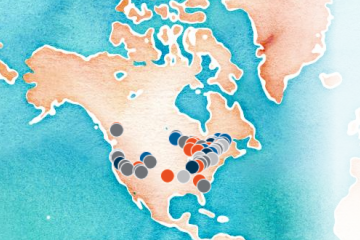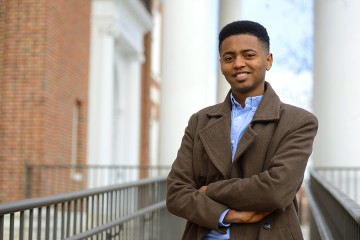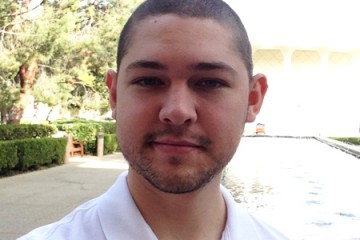Katherine Robinson uses three different translation dictionaries in her work, but she isn't learning a new language. She's learning a very, very old language—Middle Welsh, which predates the language of Shakespeare by centuries.
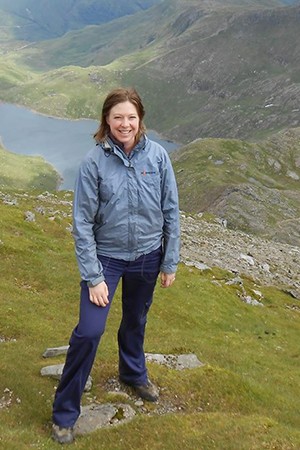
Image caption: Katherine Robinson in Wales
Robinson has been familiarizing herself with the medieval language as part of the prep work for her dissertation research, which she'll undertake as part of the prestigious Gates Cambridge Scholarship program. Established in October 2000 by a donation from the Bill and Melinda Gates Foundation, the Gates Cambridge Scholarship program welcomes students from outside the U.K. to pursue a full-time postgraduate degree at the University of Cambridge.
Robinson is one of 36 American scholars to be selected from about 800 applications. An additional 54 scholarship winners from around the world will be announced in April.
"It's still sinking in, but I'm euphoric about the honor," said Robinson, a Johns Hopkins alum who received her Master of Fine Arts from the Writing Seminars in 2012.
Robinson's dissertation will examine the connections between the works of 20th century poet Ted Hughes—who also attended Cambridge University—and a text called The Mabinogion, which was compiled by monks in the 14th century.
A collection of tales Robinson calls "fabulously strange and ravishingly beautiful," The Mabinogion dates from earlier manuscripts and oral traditions, and is widely considered to be the earliest British prose literature. The collection was first translated into English in the 1800s by Charlotte Guest, but Hughes owned three different translations. By producing her own translations, Robinson says she hopes to deepen her understanding of the source material.
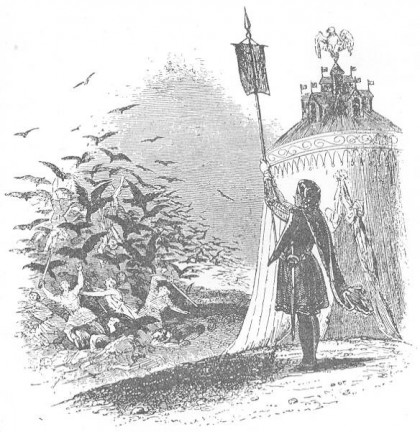
Image caption: Etching accompanying the tale 'The Dream of Rhonabwy' in the Charlotte Guest translation of The Mabinogion
Image credit: Project Gutenberg
Robinson discovered the connection between Hughes's work and The Mabinogion during her time at Johns Hopkins, where she wrote a poetry thesis under the direction of poet Mary Jo Salter.
"While I was doing my MFA and reading Crow, I realized that in one of the key poems, Hughes was retelling a tale from The Mabinogion," she said. "I kept doing research and finding that there were a lot more resonances with The Mabinogion in other poems and in other books by Hughes."
She presented her preliminary research at the Ted Hughes Conference in Sheffield in 2015 and found that she was one of the first literary scholars to publicize the connection. She has since published an article about her findings in The Ted Hughes Society Journal.
"No one had really scratched the surface of this," she said. "No one had looked at the depth and breadth of how Hughes was repurposing Mabinogion tales or explored why he was doing so, and I realized this was brand new research. I'm really excited to spend the next three years expanding on these discoveries."
She says she's also looking forward to conducting her research at Pembroke College, the same college where Ted Hughes was enrolled during his time at Cambridge.
"Hughes probably first encountered some of this mythology in The White Goddess, a book he received as a prize in grammar school, but beyond that, he may have been reading some of this early Celtic literature in the Cambridge library," she said. "It will be exhilarating to be doing this research at the university where he was first discovering some of these texts."
In addition to her academic writing, Robinson recently published a translation of the medieval poet Taliesin in the journal Poetry Ireland. She is in the process of sending out her first collection of poems for publishing consideration, and she is writing a novel centered around the whaling tradition of the Shetland Islands.
For more information about the Gate Cambridge Scholarships and other scholarship and fellowship opportunities, visit http://studentaffairs.jhu.edu/fellowships/
Posted in Arts+Culture, Student Life
Tagged literature, poetry, scholarships




